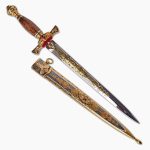Daga – a dagger for the left hand when fencing with a sword, which became widespread in Europe in the 15th-17th centuries.
When wearing a dagu without a scabbard, they held it behind the belt on the right side in order to facilitate its snatching with the left hand. In a duel, the dagu, like the sword, was put forward with the point forward, aiming it at the level of the opponent’s neck. During the duel, strikes and lunges of the opponent’s sword blade were caught on the dagu, and retaliatory blows were carried out with the sword in the right hand. A distinctive feature of fencing with the use of dagi is the presence of a large number of options for double actions – combinations of double defenses and strikes. In addition to defensive purposes, the daga was used as an offensive weapon at short distances.
Dagger – Emperor
4 090 USD
The best gift for a man available in the UK. The dagger will decorate your private office and become a family heirloom.
Order production
Description
Additional information
| Material |
Cubic Zirconia, Gold 24KGP (gold plating), High alloy steel, Nickel plating, Silver plating 22K, Wood |
|---|---|
| Package |
Wooden box with fabric lodgement |
Shipping & Delivery


FREE SHIPPING
Pegasus Leaders offers free DHL express shipping worldwide.
Delivery of the order is made by courier to the door
SAFETY
- Each order is securely packaged. Air-bubble film, corners, cardboard, wooden are used.
- We insure our products against damage and accident during transportation. Check the safety of the products at the time of receipt.
- After processing the order and receiving all export permits, we will send you a tracking number for your order.
Depending on the country and the amount of the order, you may be required to pay customs duties in accordance with the customs laws of the country of destination. Each country decides for itself what customs fees and on what goods it establishes. According to the international rules of trade Incoterms 2020 CIF, the seller cannot pay customs duties and fees of the buyer's country. The buyer pays for them.



























